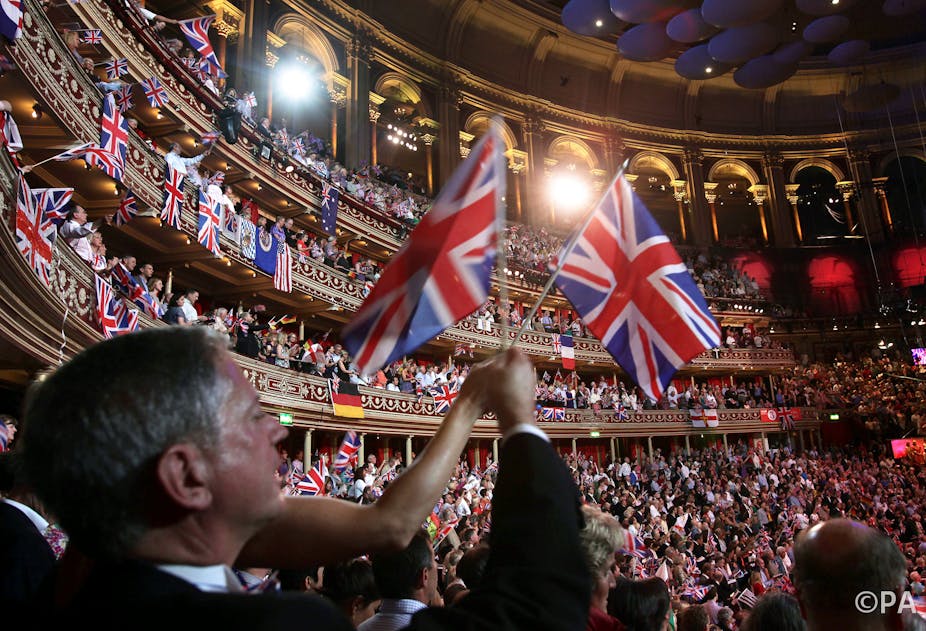The BBC Proms, with justification, is flaunted as the world’s largest and most significant annual music festival. A bronze bust of the conductor Sir Henry Wood, is placed in front of the organ facing the audience for the season. It acknowledges his importance in curating this type of musical entertainment – classical music for the masses.
In fact, Wood was not the originator. Others had succeeded in developing the idea that the musical appreciation of the nation could be elevated by providing good music to a popular audience for a modest price. The business model involved dispensing with the usual seating arrangements, and this also imposed an informal atmosphere that people warmed to. Precedents can be found in 18th century pleasure gardens.
But the true origin is found in the British army, which ran the most ubiquitous, well-organised and influential sector of British music in the 19th century.
By the 1850s the number of full-time military musicians vastly outnumbered civilians in the profession. In 1878 Jacob Kappey had carefully counted them for an article in the first edition of Grove’s Dictionary. He calculated that there was a shade short of 5,000 musicians in the British army, and 52,000 throughout Europe. Most of the army’s music recruits came as boys from orphanages and workhouses.
From trade directories and other sources we can deduce that the civilian profession, fractured and badly organised as it was, could not have provided employment for more than about 2,000 across the country.
The civilian conservatoires, despite the dizzy heights they have now reached, were, at that time, little more than glorified finishing schools. According to a report of the Royal Society into the state of musical training in London, one mother, asked why she wanted to enrol her two daughters into the Royal Academy of Music when both were devoid of any musical skill or talent, said that her “doctor had recommended it”.
And so The Military School of Music, when it opened in 1857, was the only British institution genuinely dedicated to the production of music professionals.

Military musicians had an influence in the 19th century which modern writers have been reluctant to acknowledge. Leaving aside its sheer size, it had more interaction with the population as a whole than any other musical institution. The British state recognised this and used it in the interests of what is now termed “soft power”: uniformed soldiers marching to patriotic music promoted national confidence, not just in the army, but in the British establishment itself.
The British military also had a broader plan: its mission was to combine the impression of invincible efficiency with more educational objectives.
Little original music of any substance (other than marches) was written for military bands before the 20th century. This was intentional: the military believed that other than supporting ceremony, its main purpose was to perform the greatest music.
Many regiments had orchestras – the Royal Artillery had one of 100 players with a concert series in central London; it gave the first British performances of many important works, including Tchaikovsky’s 1812 Overture. Bands restricted to wind instruments played transcriptions. Bandmasters were painstakingly instructed on how orchestral instruments and even voices could be imitated by wind instruments. Their scores, many of which survive, demonstrate remarkable subtlety in this respect.
Military bands gave performances in public gardens and other sites and these were enormously popular. They matched the Proms idea almost exactly, playing great classical music to the public in accessible venues. In 1856 certain London parks were made formally available for concerts on Sundays. The prime minister believed that such concerts would “afford inhabitants of the metropolis innocent intellectual recreation combined with fresh air and exercise”.
But the practice wasn’t supported by all. A petition of 113,000 signatures and 550 letters was presented to the prime minister. The Archbishop of Canterbury objected too, saying he could “not be answerable for the religion of the Country if the Bands were not stopped”. The established church resisted all Sabbath activities other than worship.
It was a controversial episode, but as with so many Victorian moral dilemmas, it simply prevailed as a source of joy for some and deep misgiving for others, and eventually ebbed from the foreground to the background.
What followed was a wide acceptance of the idea that music crosses social classes. And the idea seems to have a special potency in more relaxed environments on these summer days.

